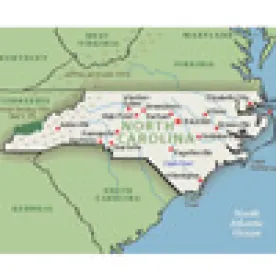MEDICAID EXPANSION DELAYED
According to Kody Kinsley, secretary of the North Carolina Department of Health and Human Services, the implementation of Medicaid expansion may be postponed until next year.
The department had hoped the expansion, which will give health insurance to hundreds of thousands of North Carolinians with low incomes, would go into effect in October. That deadline was dependent on the General Assembly passing a budget by September 1 or voting to grant DHHS the authority to proceed without a budget.
Before individuals could begin receiving coverage, House Bill 76, a separate expansion law that Governor Roy Cooper signed into law in March, required the passage of the state’s budget. Kinsley's office had been coordinating closely with federal regulators to launch expansion as soon as lawmakers passed the budget.
Though a budget law was supposed to be in place by July 1, negotiations between House and Senate leaders have ground to a halt during the summer. Earlier this month, lawmakers suggested that a budget would not be finalized until September, and they refused to separate the implementation of Medicaid expansion from the spending law. This week, there are no formal votes planned in either chamber.
According to DHHS, no new launch date will be decided until lawmakers approve the budget. The budget's passage is anticipated to occur the week of September 11; legislative leaders are currently working on the final details. Even with that deadline, according to Kinsley, expansion might not go into effect until December 1 due in part to Medicaid funding's quarterly structure, which is dependent on hospital and insurance taxes.
Under Medicaid expansion, an estimated 600,000 people will be eligible. According to Kinsley, 80 percent of these residents "come from working families."
The delay will impact a large number of current enrollees who were recently found to be ineligible for coverage, as well as an additional 300,000 residents who would have been able to sign up for Medicaid shortly after the rollout.
The federal government had promised the state a $1.6 billion "signing bonus" if the legislature approved Medicaid expansion, so the state may also face financial consequences due to the delay. According to Kinsley, North Carolina will not see any of the money until "we enroll our first beneficiary."
“Each month of delay costs the state hundreds of millions of dollars flowing into communities across North Carolina to support care and treatment for people and help keep providers’ doors open,” Kinsley said in a news release following Monday’s announcement.
Read more by The Associated Press
GOVERNOR SIGNS UNFAIR REAL ESTATE AGREEMENTS ACT
Property owners in North Carolina now have some legal protection from dubious real estate agreements. Following unanimous approval in both chambers of the General Assembly on August 16, House Bill 422 — the Unfair Real Estate Agreements Act — was signed into law last week by Governor Roy Cooper.
House Bill 422 was created in response to a real estate firm that had homeowners sign agreements with the promise that if they sold their home within 40 years, typically for $5,000 or less, the firm would act as their agent. Included in the agreements is a penalty of 3 percent of the home sale if homeowners under contract hire another realtor.
Attorney General Josh Stein filed a lawsuit against the business in March, accusing it of using misleading business tactics. The lawsuit also calls for restitution, other penalties, and both temporary and permanent injunctions against the agreements. The North Carolina Supreme Court granted the Department of Justice’s motion for preliminary injunction against the real estate firm on August 30.
The so-called "right to list" service agreements that are "binding for more than one year" are prohibited by the bill, which is sponsored by Representative Kyle Hall (R-Stokes), a realtor who also has the support of the AARP, NC Realtors, NC Land Title Association, NC Real Estate Commission, and Zillow. Additionally, it forbids contracts that "run with the land or bind future owners" or "create a lien, encumbrance, or other real property security interest."
Read more by The Center Square
GOVERNOR VETOES BOARDS/COMMISSIONS BILL
Last week, Governor Roy Cooper vetoed Senate Bill 512, which seeks to alter the governor’s powers to appoint people to a number of government oversight boards and commissions.
This past spring, legislation to transfer appointment authority from the governor to the legislature's leaders was proposed by the House and Senate, which each hold veto-proof supermajorities by a single vote. Republicans supported and Democrats opposed the bill, which was approved by the House 72-47 along party lines. The Senate approved it on a party-line vote of 27–18 without discussion.
Among the bill’s proposed changes are:
NC Department of Transportation
One of the changes would transfer eight of the governor's appointments to the 20-member Department of Transportation board to the two leaders of the House and Senate, House Speak Tim Moore (R-Cleveland) and Senate leader Phil Berger (R-Rockingham). Their appointments would rise to 14 as a result. Six members-at-large would be chosen by the governor.
The number of appointments made by the governor to the North Carolina Railroad Board of Directors would drop from seven to six, with one appointment made by the state treasurer.
Council of State
Other changes would also transfer authority away from the governor but keep it within the executive branch by giving it to another Council of State member. The legislation transfers authority to positions currently held by State Treasurer Dale Folwell, Insurance Commissioner Mike Causey, and Agriculture Commissioner Steve Troxler — who are Republicans.
Utilities Commission
By current law, the governor appoints each commissioner who oversees Duke Energy, Dominion Energy, natural gas pipelines, and renewable energy applications. The commission also approves the plan Duke Energy must submit every two years outlining how it intends to reduce carbon dioxide emissions while maintaining grid reliability.
The North Carolina Utilities Commission would have five rather than seven members under the proposed bill. Additionally, it would grant Republican leaders in the General Assembly the authority to appoint two commissioners, who would take office as soon as the bill is approved as lawmakers have not yet confirmed two of the three commissioners that Governor Cooper reappointed.
Environmental Management Commission / Coastal Resources Commission
There are 15 members of the Environmental Management Commission, which approves state regulations governing clean air, water, and other natural resources. Cooper receives nine appointments under the current system. Two of those nine appointments would instead be made by the state’s Agriculture Commissioner, currently Steve Troxler.
Similar circumstances exist on the Coastal Resources Commission, where Cooper appoints nine out of the 13 members. The commission is in charge of managing regulations for coastal infrastructure, including docks and septic systems. Three of those appointments would no longer be made by Cooper under Senate Bill 512, which would instead give one to the Commissioner of Insurance, currently Mike Causey, and two to General Assembly leaders.
State University Boards
The boards of trustees at UNC-Chapel Hill and NC State would each increase in size by two, bringing the total to 15, and the General Assembly would gain the authority to appoint the additional members.
By doing so, the number of individuals appointed to those boards by the legislature would increase from four to six. Each board would still have eight members appointed by the UNC System Board of Governors. The only UNC System boards of trustees impacted by the increase in membership would be those of UNC and North Carolina State.
Democrats have challenged the bill’s constitutionality. If the governor’s veto is overridden and the bill becomes law, the decision may ultimately go to the North Carolina Supreme Court.





 />i
/>i
